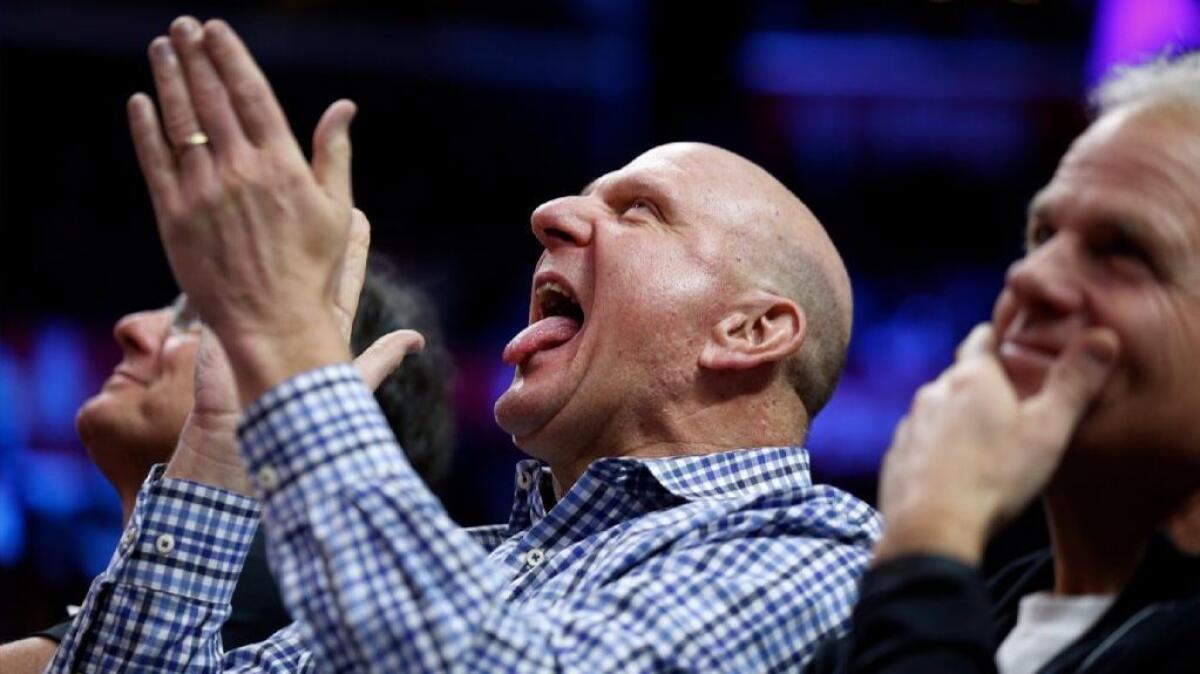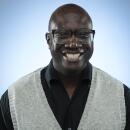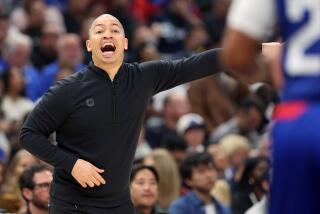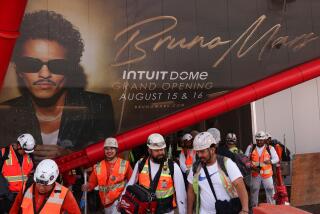Times Q&A: Clippers owner Steve Ballmer shares his thoughts on Chris Paul, the Inglewood arena and more

- Share via
Reporting from Honolulu — Clippers owner Steve Ballmer is a visible presence at most of the team’s home games. He’s animated, vocal and seems to take every point personally. He doesn’t speak to the media very often, but here, in a wide-ranging interview with The Times, he addresses many of the topics that Clippers fans want to know about.
The questions and answers were edited for brevity and clarity.
Are you happy with your marketing efforts in the Los Angeles market and do you believe you’ve made inroads on the Lakers?
I think we have an opportunity to really refine and position what we stand for and where we’re going. Obviously there are storied programs. … UCLA basketball is easier for me to point to than some of the other pro teams [laughing]. And we haven’t had that success. There’s a what-have-you-done-for-me-lately [mentality]. I think we’re on a good path. … We’re a little grittier. I think it’s OK. I think there is a whole side of L.A. that’s hard-working, tough-minded. There’s certainly some flash. Even if you look at folks in the entertainment business, we have our own fans. … I love it when [actor] Anthony Anderson shows up religiously at our games. James Brooks. Billy Crystal. It’s pretty cool for us. I think we’ve got plenty of space to identify ourselves as guys who love being in L.A., we love how cool it is in L.A. and we’re just going to ride it out and show L.A. what it means to be tough. … We are persistent. We are diligent. We are hard core. We’ll have our day in the sun.
You were the CEO of Microsoft and now you own the Clippers. What has been the toughest thing about being the owner of a sports franchise that you didn’t expect?
There are similarities and there are differences between the two. We have a product development group here at the Clips. That’s kind of what the front office does. Right? We have star engineers here at the Clippers, just like we did at Microsoft. They’re called basketball players. The key to doing really great work is to have those star engineers. They get treated real nice in companies like Microsoft.
You’ve got a sales and marketing engine that’s got to come through, pay the bills. There was a guy at Microsoft who said, “You have to execute to earn your mission to be creative.” So we’ve got this execution engine that enables us to make the kind of investment that we want to make in our team. So, there are a little more similarities than you think. Business has a form of accountability and teamwork that’s important. But in business you’re accountable, and yet things don’t really change day to day. They change year to year, maybe six months to six months.
When you work in business and you get a lot of attention, people can come look at your stock price. But it’s not like in basketball. Everybody pretty much knows exactly what the coach knows. Everybody can look at everything. They can look at statistics. They can watch the same performance. They can see it. It’s all out there. It’s another level of accountability, too.
How are the highs and lows when you watch the Clippers play?
You get pretty low when you lose your top players two playoffs in a row. And then to lose Blake [Griffin in the 2017 playoffs, after losing him and Chris Paul in 2016]. To lose the way we did to Houston [in the 2015 playoffs, blowing a 3-1 series lead] in my first year when I was looking at the team. We lost to Oklahoma City [in the 2014 playoffs]. That was about the time I was looking into buying the team. So, there’s some real heartbreak in there for us. Some of which is of our own making and some of which it came upon us from the health from above.
You took the president title away from Clippers coach Doc Rivers, promoted Lawrence Frank to president of basketball operations, hired Jerry West as a consultant and hired more people in the front office. Why?
I don’t want to imply I’m micromanaging. I’m not going to be. When it comes time to sign a big contract, people love to say, “Who’s in charge?” I’ll tell you who’s in charge. The owner. I’m not saying the owner does this without a lot of advice and counsel, but before you spend $170 million or $205 million, guess what? The guy who has got to pay the check has got to buy in. And I have to be willing to stand up for decisions. So does Lawrence. So does Doc. We all have to be willing to stand up for that decision. You can’t doubt there is some wisdom from hearing from Jerry West [laughing]. That was an opportunity that presented itself that was pretty exciting.
When did you find out Chris Paul wanted to be traded to the Houston Rockets and how do you now sell your fans on your team being exciting and relevant with perhaps your best player gone?
I started getting a hint earlier in the spring from Chris. I have a good relationship with Chris. I can’t say he said anything. But I was getting a little bit of a vibe and I knew we had to work hard to keep him. After our season, I sat down with Chris right away. We talked, we had breakfast and we stayed in continuous touch on the topic. I knew we were not in the best of shape and I was working my ass off [to keep him], as was everybody else, because he is a Hall of Fame player.
The final decision I got from Chris; I was actually talking to him when I was on vacation. I’m on some ship in the Greek Isles talking to Chris. He called me when I was in these ancient ruins. I sat there looking at these ruins. And he was very emotional as well. We had a heart-to-heart kind of conversation. I’ve had dinner with him since. There’s no reason not to be friendly with the people as people. I’m not rooting for him when he plays us. J.J. [Redick] and Jamal [Crawford], I’ve seen them all since they’ve moved on. I had dinner with J.J. in New York and I went to Jamal’s Pro-Am [in Seattle].
I don’t know if we’re going to be worse than we were last year. I don’t know that. Chris is an awesome player. But we’re such a different team. We are younger. We are more athletic than we were. We are longer than we were. … But we’re different and we’ll see whether we’re different good or not.
What is your vision for the arena project in Inglewood? Where do things stand in the process?
We have our exclusive negotiating agreement with the city, which is great. [Inglewood] Mayor [James] Butts has been welcoming and inviting. That’s been a good, good process. It’s our sense, and we’ll learn more as we start, there is a process where we’ll get out in front of the community. But our sense is the community would like to have the Clippers in Inglewood. It’ll be a good place for the community in addition to us. We’re certainly committed to make appropriate contributions in the community when it comes to the space and welcoming the community into some of the structures that we build up, which we have some ideas about to do. … Got to go through the process of approval, permitting, environmental.
There has been some opposition from the community. Did you expect that sort of pushback?
I think it’s fair to say there are some folks who don’t want us to build an arena. The citizens, I think we can work with. I think we had some pushback by other businesses.
What do you think of Forum owner the Madison Square Garden Company’s opposition that’s materialized in Inglewood? Have you spoken with James Dolan, one of your fellow NBA owners who owns the New York Knicks and is executive chairman of MSG?
Yeah, some pushback from other organizations. [Laughing]. We’re not going to say. But the merit is on our side. The community wants us to come in. I think there will be some issues that we’ll need to work through in the community and we’re committed to doing that, absolutely committed to doing that. That’s a collaborative process.
OK, have you seen James Dolan at any of the NBA owners’ meetings since you started the arena project?
I wasn’t at the last owners’ meeting. [Laughing]. I was here [in Hawaii]. I teach class at Stanford. I was teaching my class before training camp. So I haven’t seen Mr. Dolan. And who knows. Maybe they’re not one of the issues. We’ll see. The key thing for us is what’s good for the community, and that we are collaborative and address the issues in the community and what’s good for us. I think that’s what really matters. If I’m right in what I’m saying about that, which we’ll learn through the process, even if there is a little hubbub along the way…We have to still make sure that not only do we get permitted, [but also] the business works and all that; we have some stuff certainly to go through. So this is not a slam dunk at all.
Follow Broderick Turner on Twitter @BA_Turner
More to Read
Go beyond the scoreboard
Get the latest on L.A.'s teams in the daily Sports Report newsletter.
You may occasionally receive promotional content from the Los Angeles Times.







